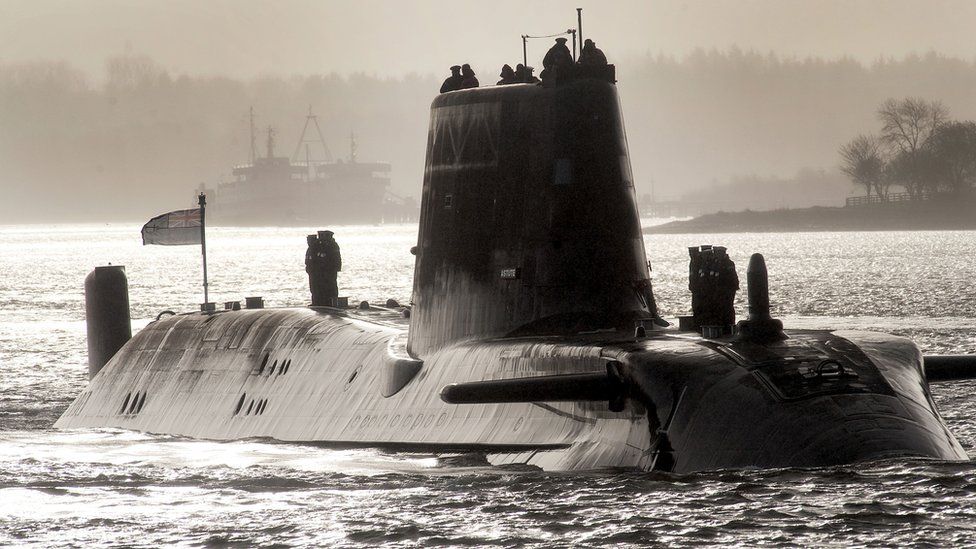ARTICLE AD BOX
 Image source, Getty Images
Image source, Getty Images
By Paul Seddon & Chris Mason
BBC News
Rishi Sunak has pledged to increase defence spending by nearly £5bn over the next two years to counter emerging threats from hostile states.
The funding boost will be confirmed in a new UK foreign and security strategy, to be published on Monday.
It comes ahead of talks between the prime minister and his US and Australian counterparts in California.
The trio are set to agree details of a UK-US pact to supply Australia with nuclear-powered submarines.
The agreement, known as the Aukus pact, was signed in 2021 as part of a joint effort to counter Chinese military power in the Indo-Pacific region.
Reports have suggested Australia could opt to build a modified version of the British Astute-class submarine, while taking delivery of up to five US Virginia-class submarines during the production stage.
Downing Street said £3bn from the extra spending would be earmarked to support the pact, along with boosting industrial infrastructure and servicing UK submarines.
The remaining £1.9bn will be used to replace weapons sent to Ukraine and improve the UK's munitions infrastructure.
Of the new money, £1.98bn will be spent this year and £2.97bn next year, with defence spending then reviewed again after 2025.
Spending after this date would be assessed against a target to increase defence spending to 2.5% of national income in the "longer term", No 10 said, without specifying a timeframe.
Mr Sunak's short-lived predecessor Liz Truss had committed to spend 3% of GDP on defence by 2030 - but the prime minister has stepped back from that pledge.
'Stand our ground'
A new version of the so-called Integrated Review will be published on Monday, replacing the first version of the security strategy document unveiled under Boris Johnson in 2021.
The update was ordered by Ms Truss in September last year to take account of Russia's invasion of Ukraine.
Downing Street said the new strategy would take account of an increased security risk posed by Moscow, as well as "increasingly concerning" military, financial and diplomatic activity by China.
It is expected to confirm extra funding for Mandarin language training and diplomatic expertise on China, as well as a new approach to guaranteeing UK access to minerals critical to new industries.
The document will also outline details of a new training curriculum for security officials, as well as a unit within MI5 to offer security advice to businesses and other organisations.
Image source, PA Media
Image caption,Rishi Sunak speaking to the press during his flight to San Diego on Sunday
Speaking ahead of the document's release, Mr Sunak said the increased defence spending would help the UK "stand our ground" in an increasingly "volatile" world.
"We have seen all too clearly in the last year how global crises impact us at home, with Russia's appalling invasion of Ukraine driving up energy and food prices," he told reporters on the plane taking him to the meeting in the US.
"We will fortify our national defences, from economic security to technology supply chains and intelligence expertise, to ensure we are never again vulnerable to the actions of a hostile power."
He also said he will formally invite Mr Biden to Northern Ireland next year to mark the 25th anniversary of the Good Friday Agreement.
The prime minister's visit to San Diego comes just 48 hours after his day trip dash to Paris and back to meet the French President Emmanuel Macron.
Mr Sunak sees both trips, in quick succession, as evidence of his desire to be "active, open and engaged around the world", as he told reporters on the flight to California.
But he confronts not just a war in Europe, in Ukraine, but a growing awareness inside government of the increasing concerns about China.
The prime minister told the BBC that Beijing presented "an epoch defining challenge to the global order" and added that it was a 'regime' that was 'increasingly authoritarian at home and assertive abroad.'
That might sound like strong language.
But some Conservative MPs would like it to be stronger.
And there are concerns from others that the promises being made for defence spending don't go far enough.
While Defence Secretary Ben Wallace has publicly welcomed the prime minister's announcement, he had been hoping for considerably more.
Labour rubbished Mr Sunak's promise, and said defence spending had not hit 2.5% of GDP since it had left power.
John Healey, the shadow defence secretary, said the Conservatives were "failing to secure Britain's national defence for the future".
"The Tories crashed the economy and sent inflation soaring, squeezing defence budgets even further as threats to the UK were increasing," he said.
The announcement, he added, would not deal with "credibility gaps" that weakened the UK's defence and its contribution to the Nato security alliance.

 1 year ago
20
1 year ago
20








 English (US)
English (US)